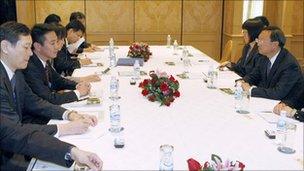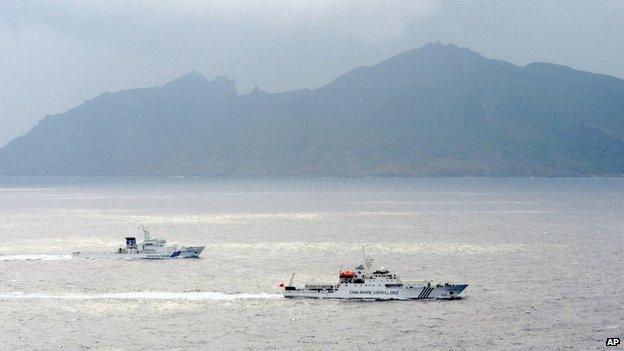Japan and China island row flares at Asean summit
- Published

Japan's foreign minister, Seiji Maehara, said the private meeting was calm
A diplomatic spat between China and Japan over a group of disputed islands has flared up again, hours after an apparently friendly bilateral meeting.
Beijing accused Tokyo of distorting facts over September's collision between two Japanese patrol boats and a Chinese trawler in the East China Sea.
Earlier on Friday, China and Japan's foreign ministers met on the sidelines of a regional summit in Vietnam.
Talks at the Asean summit had focused on next month's elections in Burma.
On Thursday, diplomats demanded that the country's military government release immediately the pro-democracy leader, Aung San Suu Kyi, who has spent 15 of the last 21 years imprisoned or under house arrest.
But Burma reportedly would not say whether she would be freed when her detention expires on 13 November, six days after the polls.
'Good atmosphere'
September's incident in the East China Sea had chilled relations between China and Japan to their lowest point for years, analysts say.
After their cordial meeting in Hanoi on Friday, Japanese Foreign Minister Seiji Maehara said he and his Chinese counterpart, Yang Jiechi, had agreed to make efforts to improve bilateral ties.
Fuelling speculation over whether Chinese Premier Wen Jiabao would hold direct talks with Japan's Prime Minister, Naoto Kan, Mr Maehara said it was likely the two men would meet in Hanoi.
But shortly afterwards, Chinese Assistant Foreign Minister Hu Zhengyue said Japan was turning the contested islands into a "hot topic".
"Their actions have damaged the atmosphere between the leaders of the two countries during the summit," he said.
China also criticised remarks by US Secretary of State Hillary Clinton - who is in Hanoi for talks with Asian leaders - that the islands fall within the scope of Japan's security alliance with the US.
The islands - known in Japan as Senkaku and in China as Diaoyu - are controlled by Japan, but claimed by China. They are close to key shipping lanes, offer rich fishing grounds and are thought to contain oil deposits.
China suspended talks about the joint development of a gas field in the East China Sea last month, but has denied also stopping the export to Japanese businesses of rare earths, which are used to produce electronic items such as mobile phones.
Other territorial disputes involving China and its neighbours are expected to be discussed during the summit, which will broaden to include other leaders from Asia, the US and Russia.
- Published3 September 2010
- Published28 October 2010
- Published10 November 2014

- Published17 September 2010
- Published8 September 2010